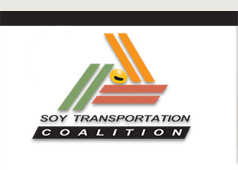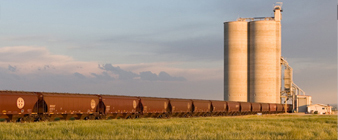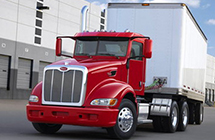 |
 |
|
| eNews • February 2018 | ||
| Promoting a Cost-Effective, Reliable and Competitive Transportation System |
||
 Trucking Companies Ordered Most Big Rigs In 12 Years
Trucking Companies Ordered Most Big Rigs In 12 Years
Trucking companies in January ordered the most new big rigs in nearly 12 years, as they hustled to take advantage of one of the hottest freight markets in recent memory.
A nationwide shortage of available trucks has sent shipping costs soaring, with retailers and manufacturers in some cases paying over 30% above typical rates to book last-minute transportation for cargo. Trucking companies, buoyed by strong demand and flush with cash following the recent tax overhaul, are accelerating plans to replace or expand their fleets.
The arrival of more trucks could stabilize the freight market, helping shippers. But relief could be months away. Many trucks ordered in January won't be delivered until the second half of the year, and fleets are having trouble recruiting enough drivers to fill seats in their existing big rigs.
Meanwhile, companies ranging from Hershey Co. to over-the-counter medicine provider Prestige Brands Holdings Inc. are reporting that the cost of moving freight is weighing on earnings. On Monday Sysco Corp. the world's largest food distributor, said steep freight cost increases hurt its profits, with additional hikes expected for several more quarters.
"We are struggling to be able to pass all that along," said Sysco chief executive Tom Bene.
In January, North American trucking companies ordered 48,700 heavy-duty trucks, the big rigs used for regional and long-haul routes, according to a preliminary report from ACT Research. That is more than double the prior-year level.
Some fleets hope to lure drivers by investing in new vehicles with features such as automated manual transmissions, which are easier to drive. Newer trucks typically get more miles a gallon of diesel, helping offset the impact of rising diesel prices.
"We're seeing the big fleets come back and modify their orders, and kick them up a little bit," said Rick Reynolds, chief executive of Peach State Truck Centers LLC, which has 11 dealerships in Georgia and Alabama. "Trucking capacity is getting tighter, and this is obviously driving people to get new product and meet that demand."
Regional carriers, which tend to follow the big fleets, "are also jumping in the game," Mr. Reynolds said.
Trucking companies are expected to benefit from the tax reform passed last month, including smaller carriers taxed at the owner's personal tax rate, giving them more money to spend on equipment, said Kenny Vieth, ACT's president.
Freight rates are soaring on strong demand from retailers and manufacturers after a standout holiday season. Truck capacity is also under pressure because of a new federal safety rule that requires truckers to electronically track their hours behind the wheel, which has kept some trucks off the road and lengthened delivery times.
Despite the rush of new truck orders, some big fleets say they are more focused on replacing their equipment than expanding.
USA Truck Inc., a large carrier based in Arkansas, plans to spend between $40 million and $50 million this year to replace between 300 and 400 trucks. Christopher Lofgren, chief executive of Schneider National Inc., another carrier, said in an earnings call last week that he hasn't noticed competitors expanding their fleets.
Trucking companies binged on new trucks in 2014, creating a glut when freight demand slumped in late 2015 and 2016. Fleets sharply cut back on orders after that, helping to set up today's shortage. Truck manufacturers shut down production lines and laid off workers, though many began raising output last year as the market began to improve.
Truck industry analysts expect production of heavy-duty trucks in North America to grow by about 25% this year to about 320,000 vehicles. That represents an increase in daily production to about 1,300 trucks, from 1,100 in December. But it may take longer for those trucks to reach the market, as the backlog of orders is now at 159,000 trucks, from 134,000 at the end of December, according to ACT.
Daimler Trucks North America, whose Freightliner brand accounts for 40% of retail sales in the heavy-duty truck market, is increasing production levels at several plants, said Jeff Allen, vice president for operations and specialty vehicles for the Portland, Ore.-based unit of Daimler AG. The company anticipates a significant increase in 2018 sales.
Daimler is relying on its flexible manufacturing system to alleviate production bottlenecks by distributing orders to whichever plants have available production capacity. For the North America market, Daimler operates truck assembly plants in North Carolina, Oregon and Mexico.
Source: The Wall Street Journal
Soy Transportation Coalition |
|
